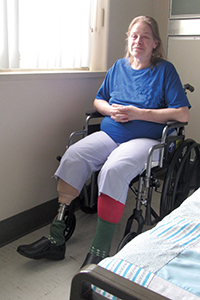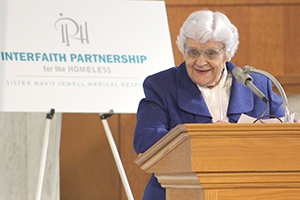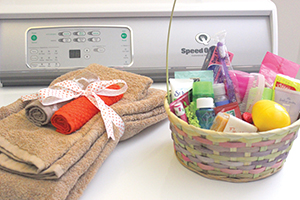Sr. Mavis Jewell, DC, leads years-long effort
By DALE SINGER
When Dorinda needed a break after a string of bad luck, she found it at St. Mary's Hospital in Troy, N.Y.

Dorinda recuperates at the Sister Mavis Jewell Medical Respite.
"I lost a job, a relationship, a parent, two dogs, my house in a storm, my leg, and my vision," the registered nurse recalled. (The hospital identified Dorinda to this reporter by her first name only.) "A blister on my heel developed a severe infection. I was admitted into the hospital, and it needed to be amputated," Dorinda said.
After being discharged from the hospital, she went to a rehabilitation facility, but her insurance ran out. "I couldn't afford to pay out-of-pocket, so I couldn't stay there," Dorinda said.
A sad end to the story could have seen Dorinda living on the street, without the care or support she needed to recover. Instead, she was able to move into the new Sister Mavis Jewell Medical Respite at St. Mary's, which opened in mid-March after several years of planning, fundraising and general prodding by the woman whose name is on the door.
"It is good here," Dorinda said. "Everyone is trying to help me."
Elbow grease
Sr. Jewell, who is a registered nurse, has worked for more than a decade with the Interfaith Partnership for the Homeless in the area that serves Troy, Albany and Schenectady in upstate New York. Norman Dascher Jr., the chief executive of Troy's Samaritan Hospital and St. Mary's Hospital, calls Sr. Jewell "a gem of a person," who is charming and fun to work with.
But he doesn't sell short her dogged determination to get things done.
"It takes someone like her to really get a project like this moving," he said of the medical respite. "She's a kind and gentle woman, but she's very, very effective at setting an agenda, bringing the right people together in a room and making her agenda happen."
Hospitalized and homeless
The theory behind the respite is simple: Patients who are discharged from the hospital need a safe, clean and supportive environment to continue their recovery. Life on the street falls far short of that kind of atmosphere.
"They would either go back to a shelter or back to the street," Sr. Jewell said, "or the hospital might have to pay for them to go to a hotel."
She remembered the plight a few years ago of a homeless 54-year-old man with diabetes, pain after back surgery and chronic pancreatitis. He underwent an emergency operation for an intestinal obstruction and was discharged 11 days later.
"He went to a shelter with an optimistic plan that a visiting nurse would provide help," Sr. Jewell recalled. "But the visiting nurse couldn't find him."
Instead, the man later had to be readmitted for an infection, was treated for several days, then released to a shelter. Without a stable place to stay, he went through cycles of hospital stays and discharges; without money to pay for it, most of his care had to be performed for free.
Settle in
Sr. Jewell began working a few years ago to provide a place for such patients to recuperate. But finding the money and a space for the patients to stay wasn't easy.

Sr. Mavis Jewell, DC, worked for years with the support of the Interfaith Partnership for the Homeless in the Troy, N.Y., area to gain support and resources for the recently opened medical respite center at St. Mary’s Hospital. It was named in her honor. Photo by Erin Curley
Janine Robitaille, executive director of the area's Interfaith Partnership, became involved, adapting ideas from similar facilities in Connecticut and Tennessee.
Finally, backers raised enough money for the respite to open. More than half of its 10 beds filled quickly, and Robitaille said the facility is helping to end the disheartening cycle of discharge, homelessness and readmission, plus arrange for follow-up care.
The accommodations aren't permanent, but Robitaille said "people can stay as long as they need to, until we can get them medically stable or find suitable housing."
Holistic care
The respite that bears her name is the latest effort that Sr. Jewell has been involved in during her long years of service as a Daughter of Charity and a nurse.
Born in Brooklyn, N.Y., and raised in Ireland, she joined her congregation more than 50 years ago. After the fall of Saigon, she helped resettle Vietnamese refugees in Pennsylvania. After Lithuania became free, she served on the Vatican's peace and justice committee, helping hospitals get badly needed equipment and supplies.
"When they got their freedom," she recalled, "they didn't have the basic things, even antibiotics. There were people dying because they didn't have antibiotics."
Her work to create the medical respite fits what she views as the spiritual aspects of nursing.
"The whole thing today is holistic care," Sr. Jewell said. "You have to think about what our mission is. We try to serve in the spirit of the Gospel as a compassionate and healing presence within the hospital.
"We have our values. We treat people with reverence, and we are committed to people who are poor and vulnerable. Hopefully, we treat people with justice."
Dascher said that unfortunately, the number of homeless people who need medical attention is growing.

Personal care items and clean clothes help respite care residents feel at their best.
"We certainly recognize in our community there's been a deficit to care for people who had nowhere to go once being discharged from the hospital," he said. "They had no physician and no place to live. We knew we could do better for those people in our community who needed those services."
He said an unused spot in St. Mary's — right down the hall from the hospital chapel — was converted to the medical respite with minor renovations.
And the people who use it will receive care that Robitaille said accounts for more than just their medical needs.
"What's your life story? What else do you have struggles with? Looking at today, tomorrow and next month — that's how we view and look at people," she said.
And that's the outlook that Sr. Jewell has brought to the project, and why it was named in her honor — a distinction that she accepted grudgingly.
"I actually did not want my name on it," she said, "but Interfaith decided they were doing it, so I didn't have much of a choice. I told them if they got a large donation, and they want to change it, they could change it."
Copyright © 2017 by the Catholic Health Association
of the United States
For reprint permission, contact Betty Crosby or call (314) 253-3490.